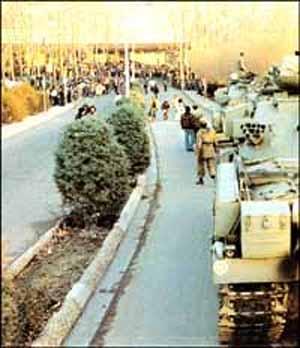General Ramtin's Account of How to Store Weapons
Compiled by: Islamic Revolution Website
Translated by: Fazel Shirzad
2024-10-29
I remember that we were in Bakhtiar's Palace on the night of 22 Bahman (10th February). There was also wireless telephone. Two or three of my colleagues and I were in the telephone room, and according to the words of the police officers whose wireless telephone was on; We heard that the police station fell down somewhere, the police station fell down here and there. Then we talked and said to come and get Bakhtiar tonight. Bakhtiar belonged to the upper class. Another thing is that there is a police station at the first of Jami Street, which was called "Center Police Station" at that time. On the wireless telephone, we could hear an officer saying that people have dropped, what should I do with the guns? The one who was talking to him said: I don't know what to do. He said: I can keep two or five of them, what should I do with the rest? This issue made me think about the storage of weapons and that we should keep and preserve these weapons in any way possible. Then with some colleagues, we started to bring weapons and collected them and appointed some people to guard them; because we heard that the people of the gangs had brought a number of Afghans and told them to go and get whatever weapons and ammunition there are and bring them and we will give you two thousand tomans (Iranian currency). Later, the issues that the hypocrites raised for the revolution probably originated from here. Well, that's what we came up with after hearing that wireless and figured out what to do in that situation. Of course, before these talks happen at all; the army was with the people and had no problem with them. We thank God, we did it, and Alhamdulillah, not a single needle point was lost from our weapons and we used all of them twice. Six days had passed since the victory of the revolution; That is, on February 28, I was at home at two in the morning when they said that Sanandaj was crowded.

I got up at two o'clock and came, ten or twelve of these comrades, some of whom have now been martyred, I called and they came with guns and a truck. In short, we used the same weapons in the missions that happened in Sanandaj and in other places.[1]
[1] Source: Oral History of the Army in the Islamic Revolution, edited by Heshmatullah Azizi, Tehran, Islamic Revolution Documentation Center, 2016, pp. 97-98.
Number of Visits: 1518








The latest
Most visited
- 100 Questions/10
- The 23rd Commemoration Ceremony of the Martyrs of the Ansar al-Rasul Battalion Held
- Third Regiment: Memoirs of an Iraqi Prisoner of War Doctor – 11
- Obstacles, Limitations, and New Horizons
- The 372nd Night of Memory – Part 3
- 100 Questions/11
- An Excerpt from the Memoirs of Mikail Ahmadzadeh
- Third Regiment: Memoirs of an Iraqi Prisoner of War Doctor – 12
The Role of Objects in Oral Narrative
Philosophers refer to anything that exists—or possesses the potential to exist—as an object. This concept may manifest in material forms, abstract notions, and even human emotions and lived experiences. In other words, an object encompasses a vast spectrum of beings and phenomena, each endowed with particular attributes and characteristics, and apprehensible in diverse modalities.100 Questions/6
We asked several researchers and activists in the field of oral history to express their views on oral history questions. The names of each participant are listed at the beginning of their answers, and the text of all answers will be published on this portal by the end of the week. The goal of this project is to open new doors to an issue and promote scientific discussions in the field of oral history.The Importance of Pre-Publication Critique of Oral History Works
According to the Oral History website, a meeting for critique and review of the book “Oral History: Essence and Method” was held on Monday morning, November 10, 2025, with the attendance of the book’s author, Hamid Qazvini, and the critics Mohammad Qasemipour and Yahya Niazi, at the Ghasr-e Shirin Hall of the National Museum of the Islamic Revolution and Sacred Defense.Challenges of Interviewing in Oral History
After years of studying the theoretical foundations of oral history, conducting numerous interviews and going through their post-interview stages, as well as reading the available body of oral history literature, I was eventually given the opportunity to evaluate the edited versions of dozens of oral history projects.

